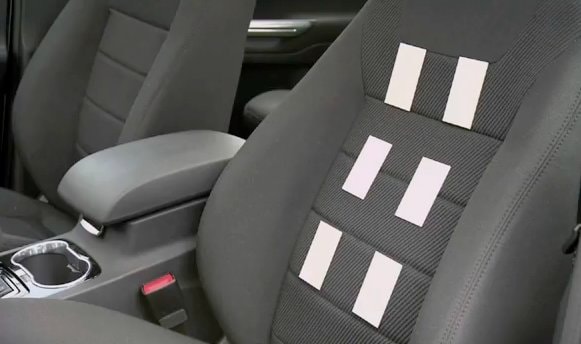The latest development added to Ford’s in-car health and wellness research portfolio is a car seat that can monitor a driver’s heartbeat via electrode sensing, a technology that uses six special embedded sensors to detect electrical impulses generated by the heart. The project has been developed together with experts from the RWTH Aachen University.
The data collected by the sensors could be linked to remote medical services and Ford vehicle safety systems, or even help providing real-time health information and alerts of imminent cardiovascular issues such as a heart attack.
Ford developed the six-sensor system positioned on the surface of the seat backrest. The unobtrusive electrodes have been specially designed to be able to detect the electronic signature of the heart through clothing.
According to Ford, in stationary testing, 90 to 95 percent of subjects proved to be compatible and on-road testing of the Ford heart rate monitoring seat proved it was possible to achieve highly accurate readings for up to 98 percent of the time spent behind the wheel, even at an early stage of development.
“The car is an obvious choice; it’s a place where occupants spend long periods sitting in a rather calm position and a place that’s increasingly less physically demanding, making it the ideal environment to measure heart activity,” said RWTH Aachen University Professor Steffen Leonhardt, who originally proposed taking the university’s work with contact-less infant heart monitoring to Ford.
Earlier this month, Ford announced it is looking into ways to make the SYNC platform support several health-related applications, including glucose device connectivity and monitoring capability, location-based allergy and pollen reports and voice-controlled, cloud-based health management services.
The data collected by the sensors could be linked to remote medical services and Ford vehicle safety systems, or even help providing real-time health information and alerts of imminent cardiovascular issues such as a heart attack.
Ford developed the six-sensor system positioned on the surface of the seat backrest. The unobtrusive electrodes have been specially designed to be able to detect the electronic signature of the heart through clothing.
According to Ford, in stationary testing, 90 to 95 percent of subjects proved to be compatible and on-road testing of the Ford heart rate monitoring seat proved it was possible to achieve highly accurate readings for up to 98 percent of the time spent behind the wheel, even at an early stage of development.
“The car is an obvious choice; it’s a place where occupants spend long periods sitting in a rather calm position and a place that’s increasingly less physically demanding, making it the ideal environment to measure heart activity,” said RWTH Aachen University Professor Steffen Leonhardt, who originally proposed taking the university’s work with contact-less infant heart monitoring to Ford.
Earlier this month, Ford announced it is looking into ways to make the SYNC platform support several health-related applications, including glucose device connectivity and monitoring capability, location-based allergy and pollen reports and voice-controlled, cloud-based health management services.
